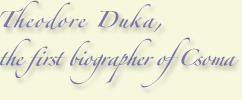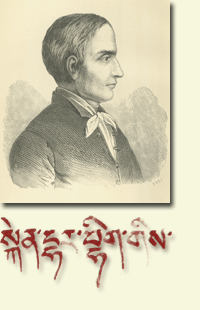|
Dukafalva, 1825 - Tivadar Duka of Dukafalva and Kucsin was born on June 22, 1825 in Dukafalva (today Dukovce, in Slovakia), into a noble Lutheran family. He began his studies in 1833, at the age of seven in the Lutheran College of Eperjes (today Preov, Slovakia), and from 1836 to 1838 he was a student of the Calvinist College of Sárospatak. In 1838 he renewed his studies in Eperjes, and in 1844 he began two years there as junior clerk. In 1846 he went to Pest, where he worked as a junior clerk for the Royal Court of Appeal, and studied law at the university, graduating with high honors. At the beginning of the War of Independence of 1848 he worked for a short while at the Department of Mining of the Ministry of Finance, but once the National Guard was organized, he volunteered for service. After the battle of Schwechat (October 30, 1848) he was summoned to the headquarters of the new commander-in-chief Artúr Görgey, where he was promoted to lieutenant. He stayed with Görgey until the end of the war, and was awarded several medals for his bravery. After the surrender of Világos (August 13, 1849; today Şiria in Romania) he fled to Gräfenberg, where he was trained in bookbinding, and began to learn English. In 1850 he went to Breslau (today Wrocław, Poland), and from there, via Dresden, to Paris. He wanted to study medicine in the French capital, but his application was rejected, due to Austrian intervention. Thus he continued his journey to London. That same year, Duka wrote his memoirs on the so-called Winter Campaign of the War of Independence, at the request of General György Klapka. In 1851 he enrolled in medical school at the Saint George Clinic in London. Duka made a living by teaching French and German, as well as by working as an assistant physiotherapist. In 1853 he was the first Hungarian to graduate in medicine in England, and that same year he was admitted to the English Royal Medical Association. During his student years he made the acquaintance of Anne Jane Taylor, daughter of the pastor and theologian Charles Taylor, whom he later married. On the advice of Sir George Pollock, Field Marshal of the British Indian Army, Duka applied for service in India. The East Indian Society accepted his application and assigned him to Bengal, in the medical corps of the British Bengalese Army. Before his appointment he was granted British citizenship. Duka arrived in Calcutta in January 1854, and at that time he began to collect references about the life and works of Sándor Kőrösi Csoma. From March 1854 to November 1855 he served as a doctor in Comilla, where he initiated the building of a public hospital, whose foundations were laid shortly before his departure from the town. In January 1856 he was assigned to duty in Mungir, where he served for eleven years. In this same year, he visited the tomb of Sándor Kőrösi Csoma in Darjeeling, where he managed to convince his local British colleague to take care of the tomb. In Mungir he composed his first essays on the life and writings of Csoma, and he authored several reports on life in India and a number of medical studies as well. While stationed in Mungir, he began to learn Persian. Later he also published some studies on the relations between Hungarian and Persian, and short translations from Persian literary works.
At the beginning of 1865 Duka returned to India again, but afflicted by a new disease, he was forced to return once again to Europe. In 1866 he visited Hungary again, and he delivered a lecture to the Royal Medical Association. In the same year he returned to India, where he was appointed head physician of Simla in 1867. In the following years he served in a number of towns: in 1868-70 in Kasauli, in 1870-71 in Patna, and in 1871-74 in Darjeeling. At the beginning of 1874 Duka left India, and spent his two years of pre-retirement vacation in Europe. In October 1876 he returned to India, and in 1877 he finally retired. Duka was active during his years of retirement. He published a series of studies on medicine and philology, and he also engaged in much activity in scientific and social organizations. In 1882 the Hungarian Academy officially requested him to write a biography of Sándor Kőrösi Csoma. With this purpose, in 1883 he went back to India, to collect the documents related to Csoma. In the archive of the Asiatic Society of Bengal he found 16 letters, and in the archive of the Ministry of Foreign Affairs, he unearthed 30 letters concerning Csoma. This correspondence revealed that the only pupil of Csoma, S. C. Malan, lived in England. Duka went to visit him, and convinced him to donate the 36 Tibetan books – among them the five so-called ‘Alexander Books’ – to the Hungarian Academy of Sciences. His masterpiece, the biography of Sándor Kőrösi Csoma, was published at the beginning of 1885. It is a common opinion that without the efforts of Duka, we would know considerably less today about Csoma. Duka, however, contributed a great deal not only to our knowledge about the life of Csoma, but also to the promotion of his memory. The same year as the publication of the biography of Csoma he established a fund at the Transylvanian Hungarian Cultural Association for the memory of Csoma. In 1889 he endowed another fund in the amount of 2000 golden forints at the Hungarian Academy of Sciences as well, to finance a commemorative conference every three years, and to publish its papers. This same year he created another fund for the students of the Lutheran College of Eperjes, and donated an important sum of money to the library of the Calvinist College of Sárospatak. He was an active promoter of the revision of the authoritative Calvinist Bible tradition of Károli as well. Duka was granted several awards for his activity, including the Semmelweis Medal and the Iron Crown Medal. He was elected as a member of honor of the Budapest Royal University of Sciences, and of the Hungarian Academy of Sciences. In addition, he was a leading officer of the Royal Asiatic Society of Great Britain and Ireland, and of the British and Foreign Bible Society. Some years before his death Duka settled in Bournemouth, South England. He donated the material of his collection about Kőrösi Csoma, his own correspondence, the offprints of his own publications and the collection of all his other documents to the Hungarian Academy of Sciences. His legacy is conserved in the Oriental Collection, and its catalogue is accessible on-line beginning in October 2006.
|


 During this period Duka also made great contributions to several Hungarian scientific institutions. On his recommendation, the Asiatic Society of Bengal sent its books existing in more than one copy to Hungary, and he purchased collections of natural science for Hungarian museums as well. In 1863 he was elected correspondent member of the Hungarian Academy of Sciences. In the same year he fell seriously ill, and thus a year later he had to return to Europe. During this period he also visited Hungary. His expansive scientific horizon is attested by the fact that at this time he delivered his inaugural lecture on the geographic and climatic description of the delta of the Ganges. Later he dedicated several studies to issues of geography and ethology.
During this period Duka also made great contributions to several Hungarian scientific institutions. On his recommendation, the Asiatic Society of Bengal sent its books existing in more than one copy to Hungary, and he purchased collections of natural science for Hungarian museums as well. In 1863 he was elected correspondent member of the Hungarian Academy of Sciences. In the same year he fell seriously ill, and thus a year later he had to return to Europe. During this period he also visited Hungary. His expansive scientific horizon is attested by the fact that at this time he delivered his inaugural lecture on the geographic and climatic description of the delta of the Ganges. Later he dedicated several studies to issues of geography and ethology.






